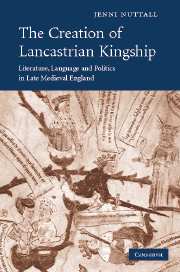Conclusion: Lancastrian conversations
Published online by Cambridge University Press: 27 October 2009
Summary
Rather than categorizing Lancastrian literature either as rebellious criticism or cowed propaganda, this book has argued instead that such works are in their political engagements both pragmatic and innovative. Lancastrian literature can easily be mistaken for propaganda because it closely tracks the Crown's concerns and uses official rhetoric as its starting point. Yet it transforms these official languages and frequently directs them towards different ends. It addresses its Lancastrian readers in language which they themselves had initiated. Lancastrian literature reminds the Lancastrian dynasty of its linguistic origins in order to demonstrate how it has broken its promises, fallen short of expectations or changed its priorities. It is aware of the Crown's perspective and policies and it puts forward dependent yet different points of view. These are the perspectives of the subject rather than the sovereign, of the employee rather than the employer. Lancastrian literature adopts the mind-set of the advice-giver, the truth-teller, the tax-payer, the unpaid servant and those who have seen monarchs rise and fall. Such perspectives are accurate and informed, both politically and linguistically.
This accuracy and political acumen is not surprising given that the authors and audience of Lancastrian literature were drawn from the Crown's councillors and administrators, those attending its parliaments and serving in the familia regis. By audience, I mean here not its named patrons or addressees but those secondary readers amongst whom such texts were likely to be circulated after or alongside presentation copies.
- Type
- Chapter
- Information
- The Creation of Lancastrian KingshipLiterature, Language and Politics in Late Medieval England, pp. 120 - 130Publisher: Cambridge University PressPrint publication year: 2007



